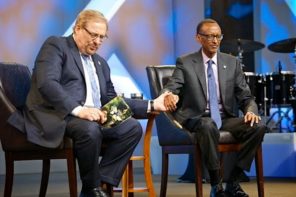Members of the “hacktivist” group Anonymous have taken down the government websites of several African countries with records of oppressing LGBT people. On Thursday of last week, they hacked and then leaked the database of Botswana’s Export Development and Investment Authority, as well as Somalia’s TV Network and Gurmad company websites, and the Sudanese stock exchange.
They’ve threatened to take down key websites in any African country in which LGBT people are subject to imprisonment or death for expressing their sexual orientation or gender identity publicly. Last week, they went a step further and posted a message on the website of Uganda’s Prime Minister, saying:
LGBT People of Uganda, Anonymous and Elite Society do not speak for you. You have inspired us with your pride, courage and self-respect. YOU are OUR heroes LGBT people of Uganda.
While the strategic intent of the hacktivist is understandable, to take such action without the consent of LGBT leaders on the ground is a grave mistake. Hope In Uganda, with which I’m affiliated, is in partnership with LGBT groups in Africa and must respect their need to lead the way strategically. We also recognize that the roots of international homophobia are found here in the United States, from our very own brothers and sisters in Christ.
Anonymous’ actions, while intended to fight oppression, perpetuate another form of oppression in their paternalistic attitude toward African people and governments: that of the “white savior.” Box Turtle Bulletin notes that “Anonymous’ actions show an appalling disregard for the efforts of Ugandan LGBT leaders and a gob-smacking hubris that they, from the comfort of their bedrooms and coffee shops, know better than the Ugandan LGBT people on the ground.”
Anonymous’ actions are particularly ironic given that many of the anti-LGBT laws in African countries are a direct result of the anti-LGBT brand of Christianity imported by evangelical missionaries like Scott Lively. In 2009, Lively addressed groups of lawyers, members of Parliament, universities, secondary schools and Christian leaders about “the ‘gay’ agenda,” and spoke at a three-day conference in Uganda. The increasing persecution of LGBT people started soon after.
As Christians we have seen how the message of freedom in Christ can be a catalyst for social justice. African-American pastors have lived the struggle to embody the vision of a just society. LGBT activists in Uganda have been working hard towards progress, as evidenced by a recent piece by activist Val Kalende, and are concerned that Anonymous’ actions will set back their efforts. In a statement released on their website on Friday, Sexual Minorities Uganda (SMUG) says:
The hacking of government websites and the corresponding statements by Anonymous do not reflect the views of SMUG and its partners, allies and/or friends. As Ugandans ourselves, we stand with our community and equally share in the burden of this illegal and counterproductive action. In our view, the act opens every Ugandan citizen to the potential of danger and hinders the operations of our sovereign nation. Additionally, it has the unfortunate potential consequence of further targeting the LGBTI community—the very individuals Anonymous claims to be supporting through their action. If a member of Anonymous had contacted any person in this office or in the LGBTI community, they would have learned this from us directly.
I am deeply concerned that Christian leaders would support policies that censor and harm LGBT people, their families, and communities. Such laws undermine the very lynchpins of freedom and democracy, the right to free expression, and particularly the right to diverse faith expressions. Christian traditions that affirm everyone as a child of God, regardless of sexual orientation or gender identity, would become illegal under the proposed bill. Ministers and bishops within those traditions would be at risk for arrest and imprisonment. We may have some theological differences among us, but we agree that we should not make criminals of those with whom we disagree.
I encourage the hacktivists to implement tactics in a manner consistent with those who work on the ground. Acting on their behalf without their consent is neither wise, nor helpful.




